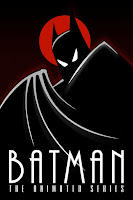Batman: The Animated Series (1992-1995) series developed by Eric Radomski and Bruce Timm and based on the comic created by Bob Kane and Bill Finger
This thirty-year old series is one of the more influential incarnations of Batman. After the big success of Tim Burton's Batman movie, a new television incarnation seemed like a logical next step. The series producers, Eric Radomski and Bruce Timm, used more than the Burton film for inspiration. Life-long superhero fans, they wanted to imitate the style of the Max Fleischer Superman cartoons from the 1940s. The show is a fascinating blend of the score and darker aesthetic from the movie with the art deco style of the cartoons. Since it's Batman, the shiny brilliance of art deco is toned down by the film noir depiction of Gotham (most of the scenes are set at night, so little sunshine on display). As a creature of the night, Batman has plenty of shadows to hide in and to cast on overconfident villains. The Japanese animation studio the producers worked with was on board with the style choices and worked hard to make the show look very good, which it does.
The real gem is the writing. The creators made a show that's okay for kids to watch but does not dumb down things or leave things at a superficial level. The stories include normal criminals, like the organized crime figures that show up in corrupt cities (not something you'd see in Saturday morning fare). They also include classic villains like The Joker and Catwoman. The Joker is brilliantly written and played by Mark Hamill (Luke Skywalker!). He has the sinister malevolence of a dangerous killer, the wicked sense of humor, and a disturbing laugh. Catwoman is a more sympathetic robber who still has romantic flirtations with Batman, not something you'd see in kids' cartoons. In the commentaries, the producers explain that they told everyone (the writers, the actors, the animators) to think that they were making short movies in an animated style, not kids cartoons to watch after coming home from school.
A lot of the secondary villains are given more backstory and pathos, they aren't just cackling fiends with crazy plans. Mister Freeze is made into more than an ice-gadgety Otto Preminger. He becomes a scientist working in cryogenics (partly to try and save his dying wife) who is horribly altered when his company breaks up his research literally. Mister Freeze is more interested in revenge against the company than in fighting Batman or causing random mayhem. Harvey Dent's transformation into Two-Face has much better depth than any other version of his character (yes, even The Dark Knight depiction). Harley Quinn was invented during the series as a more colorful henchgal for The Joker. She is at turns comic and brutal without the silly hypersexualization of her later incarnations. The attention to characters is good, the show isn't just a vehicle for action and jokes (or to sell a line of toys).
With the good writing and the animation style and tone from the 1940s (they have black and white TV and dirigibles), the show has a timeless quality that makes it still enjoyable even three decades after it originally aired on television.
Highly recommended.




